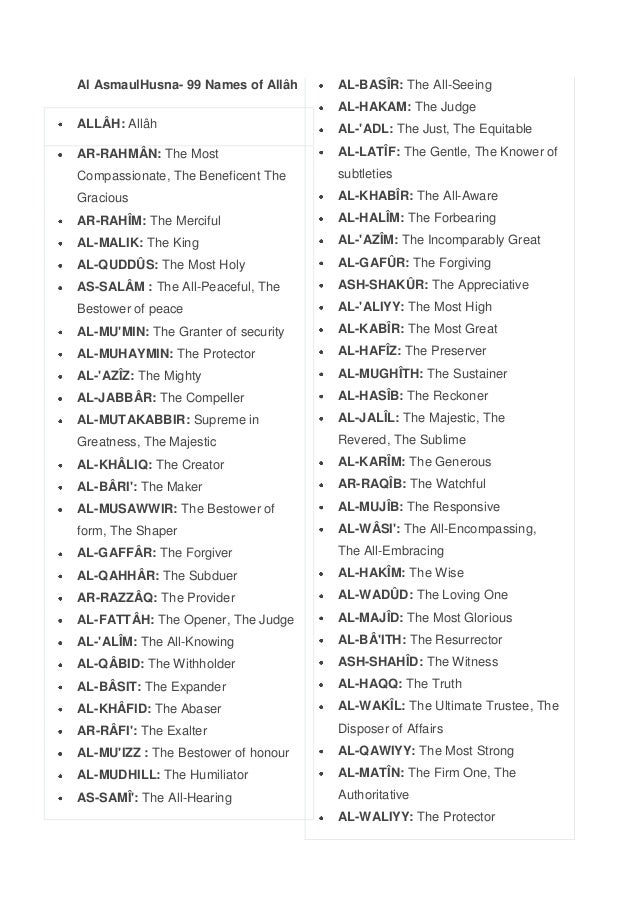As a Muslim, the names of Allah hold immense significance for me. They are not just mere labels, but powerful expressions of God’s attributes and essence. Each name reveals a different aspect of His boundless power, infinite mercy, and unrivaled majesty. Over time, I’ve found myself drawn to exploring the depths of these divine names, seeking to understand their meaning and how they can guide my life. This quest has led me to appreciate the rich and intricate tapestry of Islam’s spiritual heritage.

Image: www.slideshare.net
I remember once, during a particularly challenging period, reciting the name “Ar-Rahman” (The Most Merciful). It felt like a balm to my soul, reminding me that even in the midst of tribulation, Allah’s mercy encompasses all. From that day forward, I’ve made it a point to consciously integrate these names into my daily prayers and contemplations. The knowledge and reflection associated with them have become a source of comfort, guidance, and inspiration.
Understanding the 99 Names of Allah (Asma al-Husna)
The 99 Names of Allah, known as “Asma al-Husna” in Arabic, are considered to be the most beautiful and perfect names of God. They are found scattered throughout the Quran, reflecting the multifaceted nature of Allah’s being. These names are not just words; they are powerful affirmations of Allah’s attributes, guiding us towards a deeper understanding of His character and relationship with His creation.
Each name encapsulates a specific aspect of Allah’s divine essence, offering us insights into His nature. For instance, “Al-Qadr” (The Most Powerful) reminds us of His absolute control over all that exists, while “Al-Rahim” (The Most Compassionate) speaks of His boundless love and mercy. By reflecting on these names, we can cultivate a closer connection with Allah, deepening our faith and understanding of His divine attributes.
The Importance of Reciting and Reflecting on the 99 Names of Allah
The act of reciting and reflecting upon the 99 Names of Allah holds great importance in Islam. Here are some of the key benefits associated with this practice:
- Increased Faith and Understanding: By engaging with the names, we gain a deeper understanding of Allah’s attributes and qualities, leading to a stronger faith.
- Spiritual Purification: Reciting these names purifies the heart and mind, fostering inner peace and tranquility.
- Connection with Allah: The names act as a bridge connecting us to Allah, allowing us to experience His presence more readily.
- Seeking Forgiveness and Mercy: Many names, like “Al-Ghaffar” (The Most Forgiving), remind us of Allah’s infinite mercy and encourage us to seek forgiveness.
- Guidance and Protection: Reciting certain names, like “Al-Malik” (The King) or “Al-Qawiyy” (The Most Strong), can provide a sense of guidance and protection in times of need.
The Role of the 99 Names in Daily Life
The 99 Names of Allah are not merely theoretical concepts; they are intended to be integrated into our daily lives. We can incorporate them into our prayers, meditations, and everyday actions. For example, when facing a difficult decision, reflecting on “Al-Hadi” (The Guide) can help us seek divine direction. During times of fear or uncertainty, reciting “Al-Qayyum” (The Self-Sustaining) can provide a sense of security and assurance.
Furthermore, understanding the names can shape our interactions with others. “Al-Rahman” (The Most Merciful) encourages us to treat others with kindness and compassion, while “Al-Adl” (The Just) reminds us to strive for fairness and equity in our dealings.

Image: www.dreamstime.com
Tips for Studying and Benefiting from the 99 Names
Here are some practical tips to help you learn and benefit from the 99 Names of Allah:
- Start with One Name: Rather than trying to memorize all 99 at once, begin with a single name. Research its meaning, significance, and how it manifests in the Quran and Hadith.
- Practice Regular Recitation: Make a habit of reciting the names throughout the day, both silently and aloud. Consider incorporating them into your daily prayers or meditations.
- Reflect and Contemplate: Take time to reflect on the meaning of each name and how it can guide your actions and thoughts.
- Seek Knowledge: There are numerous resources available, including books, websites, and videos, that can deepen your understanding of the names and their significance.
- Share with Others: Share your knowledge of the names with others and encourage their study and recitation.
FAQ about the 99 Names of Allah
Q: Why are there 99 Names of Allah?
A: While the Quran mentions many names of Allah, there is no specific verse mentioning 99. However, the number 99 has been traditionally associated with the names as a reminder of Allah’s infinite attributes and the limitations of human understanding.
Q: What is the best way to memorize the 99 Names?
A: Repetition is key. Start with a few names and gradually add more. You can use flashcards, create your own lists, or listen to audio recordings.
Q: Are there specific names to recite for certain needs?
A: Yes, many Muslims recite specific names for different purposes. For instance, “Al-Rahim” for seeking mercy, “Al-Qawiyy” for strength, and “Al-Razzaq” for sustenance.
Q: How can I find the 99 Names in a PDF format?
A: There are plenty of resources available online that offer downloadable PDFs containing the 99 Names of Allah with their meanings and transliterations. Simply search for “99 names of Allah pdf” and you’ll find many options.
99 Names Of Allah In Pdf Format
Conclusion
The 99 Names of Allah are a treasure trove of divine knowledge and wisdom. By studying, reciting, and reflecting on these names, we can cultivate a deeper connection with Allah, gain greater insight into His attributes, and navigate life with more purpose and clarity. So, are you ready to embark on this journey of spiritual exploration? Download your free PDF of the 99 Names of Allah today and begin your own personal reflection!






